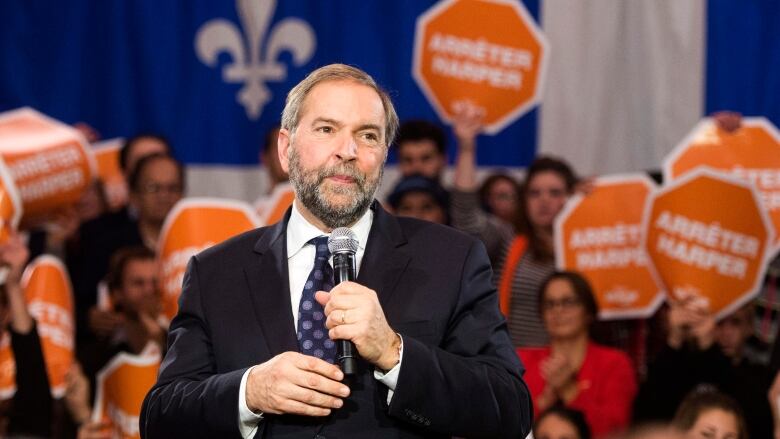Spin Cycle: Will joining the TPP trade deal increase drug costs?
NDP warns Pacific Rim trade deal will increase pharmaceutical costs, but EU trade deal already set to do that

"The Conservatives negotiated the TPP agreement in secrecy and without a mandate. The TPP will drive up the cost of life-saving drugs and slow down the introduction of generic drugs to the market."
NDP press release, Oct.15
Want to understand the repercussions ofthe Trans-Pacific Partnership agreement? Good luck, voters.
There will be no text of the TPP deal available before Monday'selection. Confidential briefings offered to the Liberals and the NDP late this week were turned down, amidallegations of partisan gamesmanship.
TwelvePacific Rim countries, including Canada, are poised to entera trade pact representing 40 per cent of the world's economy. Itgoes far beyond tariff reductions and includesabroad range oflaws and regulations.
- Compare the 2015 federalelection platforms
- Tom Mulcair's family hardships shaped TPP opposition
- Liberals, NDP decline PCO offer of confidential briefing on TPP trade deal
- Trans-Pacific Partnership text won't be available before election
Stephen Harper's Conservatives are campaigning on it. Justin Trudeau'sLiberals haven't fully embraced it yet, but arewilling to give it a good look.
But Tom Mulcair's NDP appears to oppose it, even without seeing all the details. Among thereasons cited areincreasing prescription drug costs. Is that objectionwell-founded?
The spin
Two aspects of the TPPmight factor in.
The first was one of the stickiest issues in the TPP's final, marathon talks in Atlanta two weeks ago: the data exclusivity period for biologic drugs.
That's different from apatent, whichdeterminesthe length of timeclinical trials data belongs to brand-name manufacturers, and would delaythose who wish to createcheapergenerics.
The TPP offers several "paths" for countries to comply, Canada's Trade Department has disclosed. One pathprovides eight years of data exclusivity, while another path, negotiatedat the 11th hour to accommodatecountries like Australia, requires five years plus additional country and market-specific measures.
Asdata exclusivity periods increase, theoverall drugcostsfor some countries could rise.
- Stephen Harper on TPP: 'We got a good deal'
- Trans-Pacific Partnership: Industry, provincial reaction is mixed
- Keith Boag: Hillary Clinton's opposition to the TPP deal might be just'talking'
- Trans-Pacific Partnership: How the deal was done
The second issue came to a head in June, when WikiLeaks published an alleged draft of the TPP'stransparency chapter, which includesan annex with new rules forthe pharmaceutical industry.
It suggestedcountries would have to be more transparent about their now-confidential bulk rebatenegotiations with drug companies or risk being sued.
New Democrats and other critics saythisleak suggestsgovernments wouldhave difficulty negotiatinglower bulk purchase prices for drugs. Canada's premiers have been collaborating on such an approachsince 2010, and thefederal government which buys drugs for prisoners, First Nations, soldiers and veteransasked to join last July.
The counterspin
TheCanadian Generic Pharmaceutical Association tracked the TPP talks closely. Itsreaction so far is positive.
In a release, it welcomed assurances"that the final TPP text will require no changes to Canada's intellectual property laws for pharmaceuticals, beyond the commitments that have already been made under the Comprehensive Economic and Trade Agreement (CETA) Canada has reached with the European Union."
Canada has yet to implementchanges CETA requires. Legislation waits untilEuropean countries are closer toratifying Canada's2013 deal something that might be up to two years away.
But whatTPP requires on drug patents and data exclusivity iseither already done, or pendingfor CETA.Canada already provides eightyears of data exclusivityfor biologics, for example.
On bulk purchases, Canadian officialsconfirmthere is a "Transparency and Procedural Fairness for Pharmaceutical and Medical Devices" annex. But for now, there's onlyfew vagueparagraphs of summary on the trade department'swebsite.
"Neither this annex nor any other part of the agreement will affect the ability of the federal, provincial or territorial governments to negotiate drug prices orundertake bulk purchases," adepartmental spokesman wrotetoCBC News.
The final rinse
Without seeing the final text,it's impossible to know if the leak accuratelyrepresents the TPP.
Marc-Andr Gagnon, a health policy expert at Carleton University, has been studying both trade deals.
"TPP itself, especially after CETA, will have very little impact right now in terms of the cost of our drugs," he said. However, his analysis suggests CETAcould hike brand-name drug prices by roughly six per cent.
And that's where things get confusing in terms of understanding the NDP's position. It hasn't opposed CETA, at least not yet,but it is campaigning againstthe TPP.
- ANALYSIS |Spin Cycle: Only the Conservatives are free traders, right?
- Highlights: What's in the Trans-Pacific Partnership agreement?
- Canadians divided on benefits of Trans-Pacific Partnership: Vote Compass
CETA, New Democrats argue,offers more new marketsin return for this sacrifice. Further, the NDPmuses about the possibility of reopeningCETA, provided Canada hasn't already locked in changes byratifying TPP first.
Gagnon thinks thatwhat the provinces are doing now to negotiate bulk drug rebates likely won't be harmed by the TPP.
But he's concerned aboutclauses limitinghow far Canada might be able to go down the road on pharmacare.
Gagnoncalledthe leakedtransparency requirements "very problematic."
"Companies can sue the governments if they're unhappy with the decisions because the decision is not transparent enough, but at the same time the states do not have the capacity to sue the drug companies," he said.
Drug companies have set artificiallyinflatedprices, with little recourse for purchasers.At the very least, TPP should bereciprocally transparent, he said.
All fourfederal partiessayCanadians paytoo much for drugs, but disagree on what to do about it.
New Democrats and Greens proposea national drug plan. The 2015Liberal platform doesn't go that far, but suggestsworking with the provinces to cut costs. The Conservative platform has nothing on the issue, but Health Minister Rona Ambrose approachedprovinces this summer seeking collaboration.
"This type of position is a little bit contradictory," Gagnonsaid. On the one hand the Tories have movedto support or even join provincial efforts towardbulk drug purchasing, while on the other negotiating a trade deal that could undermine the provinces' capacity to do so.












_(720p).jpg)


 OFFICIAL HD MUSIC VIDEO.jpg)
.jpg)



























































































